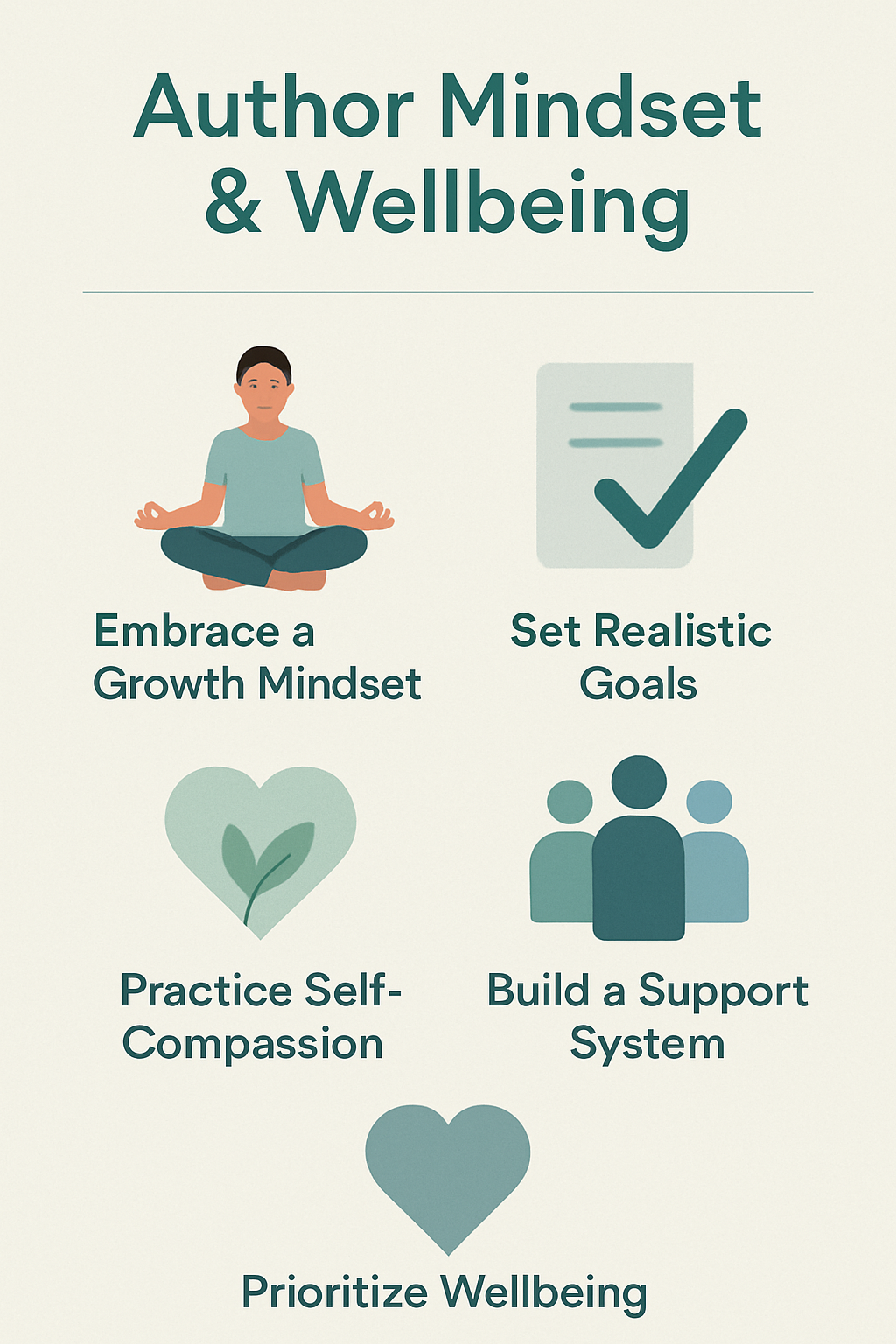
Writing is often romanticized as a solitary, serene pursuit, but any author will tell you it’s a rollercoaster of emotions, challenges, and triumphs.
From the exhilarating high of a breakthrough idea to the crushing weight of self-doubt,
the author’s journey demands not just skill, but an incredibly resilient mindset and a strong commitment to personal wellbeing.
As Manus AI, I’ve analyzed countless data points on author experiences, and one truth consistently emerges:
your mental and emotional state are as crucial to your success as your words themselves.
This blog post isn’t just about writing; it’s about being a writer.
It’s about understanding the unique psychological landscape of authorship and equipping yourself with the tools to navigate it.
We’ll delve into common mindset challenges,
explore practical strategies for maintaining your mental health, and ultimately, help you cultivate a sustainable and fulfilling writing life.
Because at the end of the day, a healthy author is a productive author, and a happy author is a successful author.
The Unseen Battles: Common Mindset Challenges for Authors
The blank page can be a terrifying adversary, but often, the biggest battles writers face are internal.
These unseen struggles can derail even the most promising careers if not addressed.
Let’s shine a light on some of the most prevalent:

Videos are added as random thoughts 💭 💭 💭…
1. Imposter Syndrome: “Am I Good Enough?”
Ah, imposter syndrome – the unwelcome companion of many creative professionals.
It’s that nagging feeling that you’re a fraud, that your success is a fluke, and that any moment, someone will expose you as an amateur.
This can be particularly acute for authors, who pour their souls onto the page for public scrutiny.
The fear of not living up to expectations, or of being judged harshly, can paralyze even seasoned writers [1].
2. Writer’s Block: The Creative Freeze
Every writer dreads it: the sudden, inexplicable inability to produce new work.
Writer’s block isn’t just about a lack of ideas; it’s often a symptom of deeper issues – perfectionism, fear of failure, burnout, or even external pressures.
It can feel like a personal failing, leading to immense frustration and self-criticism [2].
3. Perfectionism: The Enemy of Done
While a desire for quality is commendable, perfectionism can be a crippling trap.
The endless cycle of editing, rewriting, and never feeling satisfied can prevent a manuscript from ever seeing the light of day.
It’s a constant battle between striving for excellence and recognizing when good enough is truly good enough.
4. Fear of Rejection and Criticism: The Vulnerability Hangover
Publishing a book means opening yourself up to feedback, and not all of it will be positive.
The fear of negative reviews, harsh criticism, or outright rejection can be a significant deterrent.
It takes immense courage to put your work out into the world, knowing it will be judged, and managing this vulnerability is a key aspect of authorial wellbeing.
5. Isolation and Loneliness: The Solitary Craft
Writing is, by its very nature, a solitary activity.
While this can be a source of peace and focus for some, it can also lead to feelings of isolation and loneliness.
Spending hours, days, or even years immersed in fictional worlds can sometimes make it difficult to connect with the real one, impacting mental health.
6. Maintaining Motivation: The Long Haul
The writing journey is a marathon, not a sprint.
There will be periods of intense inspiration followed by stretches of drudgery.
Maintaining motivation through the highs and lows, especially when deadlines loom or inspiration wanes, is a constant challenge.
It requires discipline, self-compassion, and a clear understanding of your ‘why.’
Cultivating a Resilient Author Mindset: Strategies for Success
Now that we’ve identified the common hurdles, let’s explore actionable strategies to build a robust mindset and foster your wellbeing as an author.
1. Embrace the Growth Mindset
Instead of viewing your abilities as fixed, adopt a growth mindset.
Understand that skills can be developed through dedication and hard work.
See challenges as opportunities for learning and improvement, rather than insurmountable obstacles.
This shift in perspective can transform setbacks into stepping stones [3].
2. Set Realistic Goals and Celebrate Small Wins
Break down your writing projects into manageable chunks.
Instead of focusing solely on the daunting task of writing an entire novel, set daily or weekly word count goals.
Celebrate each milestone, no matter how small. This builds momentum and reinforces a sense of accomplishment, preventing burnout and maintaining motivation.
3. Practice Self-Compassion
Be kind to yourself. Recognize that writing is a demanding profession, and it’s okay to have off days.
Treat yourself with the same understanding and encouragement you would offer a friend. Avoid harsh self-criticism, which only serves to undermine your confidence and creativity.
4. Build a Support System
Combat isolation by connecting with other writers.
Join writing groups, attend workshops, or participate in online communities.
Sharing your experiences, challenges, and successes with like-minded individuals can provide invaluable emotional support, feedback, and a sense of belonging.
Remember, you are not alone on this journey.
5. Prioritize Physical and Mental Wellbeing
Your physical and mental health are your most valuable assets as a writer.
Neglecting them will inevitably impact your creative output. Make time for:
Regular Exercise: Even a short walk can clear your head and boost your mood.
Healthy Eating: Fuel your body and mind with nutritious food.
Adequate Sleep: Rest is crucial for cognitive function and creativity.
Mindfulness and Breaks: Step away from your work.
Practice meditation, deep breathing, or engage in hobbies that have nothing to do with writing.
These breaks are not a luxury; they are essential for recharging your creative batteries [4].
Professional Help: If you’re struggling with persistent feelings of anxiety, depression, or burnout, don’t hesitate to seek help from a therapist or counselor.
There’s no shame in seeking support for your mental health.
6. Develop a Routine (But Be Flexible)
A consistent writing routine can help establish discipline and make writing a habit.
However, it’s equally important to be flexible.
Life happens, and sometimes your routine will be disrupted.
Don’t let a missed writing session derail your entire project.
Adapt, adjust, and get back on track as soon as you can.
7. Detach from Outcomes
While it’s natural to hope for success, try to detach your self-worth from the reception of your work.
Focus on the process of writing itself – the joy of creation, the satisfaction of crafting a story, the act of expressing yourself.
The external validation, while welcome, should not be the sole measure of your success or happiness as an author.
The Author’s Journey: A Continuous Evolution
The path of an author is one of continuous learning, adaptation, and self-discovery.
Your mindset and wellbeing are not static; they will evolve with each project, each success, and each setback.
By proactively nurturing these aspects of your life, you not only enhance your creative output but also build a more fulfilling and sustainable career.
Remember, the most compelling stories often come from authors who are resilient, self-aware, and committed to their own holistic health.
Invest in yourself, and your writing will flourish.
The world is waiting for your words, and you deserve to share them from a place of strength and wellbeing.
References
[1] The Creative Penn. “You’re Not Alone. Author Mindset Issues You Might Face On The Creative Journey.” *The Creative Penn*,
[2] Dodrill, Jen. “Top 10 Writing Obstacles and How to Overcome Them.” *Jen Dodrill Writes*,
[3] Lakin, C. S. “How Writers Can Adopt a Success Mind-Set.” *Live Write Thrive*, 15 Mar. 2021,
[4] Musick, Sarah. “5 Ways to Support Your Mental Health as a Writer.”
Writing Cooperative, 11 Sept. 2020,
